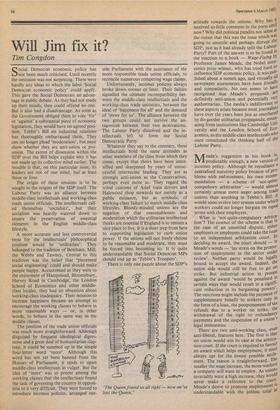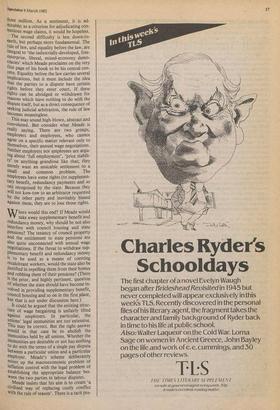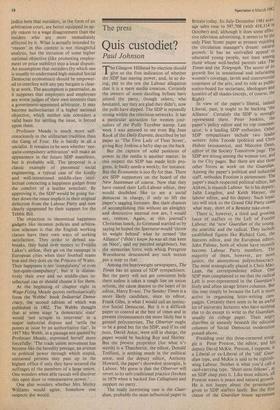Will Jim fix it?
Tim Congdon
Social Democrat economic policy has not been much criticised. Until recently the omission was not surprising. There were hardly any ideas to which the label 'Social Democrat economic policy' could apply. This gave the Social Democrats an advan- tage in public debate. As they had not made up their minds, they could offend no one. But it also had a disadvantage. As soon as the Government obliged them to vote 'for' or 'against' a substantial piece of economic legislation, they would have no agreed posi- tion. Tebbit's Bill on industrial relations has thoroughly embarrassed them. They can no longer plead 'moderation', but must show whether they are anti-union or pro- union. The extent of dissension within the SDP over the Bill helps explain why it has not made up its collective mind earlier. The trouble is that, on this particular issue, its leaders are not of one mind, but at least three or four.
The origin of these tensions is to be sought in the origins of the SDP itself. The Labour Party was an alliance between middle-class intellectuals and working-class trade union officials. The intellectuals call- ed themselves 'socialists', but their socialism was heavily watered down to ensure the preservation of essential elements in the English middle-class lifestyle.
A more accurate and less controversial term for the intellectuals' philosophical position would be 'utilitarian'. They belonged to the tradition of Bentham, Mill, the Webbs and Tawney. Central to this tradition was the belief that 'piecemeal social engineering' could and should make people happy. Accustomed as they were to the enjoyment of Hampstead, Bloomsbury, Harvey Road in Cambridge, the London School of Economics and other middle- class locales, they had an obsession about working-class inadequacy. Their mission to increase happiness became an attempt to encourage the working classes to behave in more reasonable ways — or, in other words, to behave in the same way as the middle classes.
The position of the trade union officials was much more straightforward. Although disguised by frequent ideological digres- sions and a great deal of humanitarian clap- trap, it could be summed up in the simple four-letter word 'more'. Although this word has not yet been banned from the Houses of Parliament, it tends to upset middle-class intellectuals as vulgar. But the idea of 'more' was so potent among the working classes that the intellectuals found the task of governing the country in opposi- tion to it very difficult. They were forced to introduce incomes policies, arranged out-
side Parliament with the assistance of the more responsible trade union officials, to reconcile numerous competing wage claims.
Unfortunately, incomes policies always broke down sooner or later. Their failure signalled the ultimate incompatibility bet- ween the middle-class intellectuals and the working-class trade unionists, between the ideal of 'happiness for all' and the demand of 'more for us'. The alliance between the two groups could not survive the an- tagonism between their two motivations. The Labour Party dissolved and the in- tellectuals left to form the Social Democratic Party.
Whatever they say to the contrary, these intellectuals hold the same attitudes as other members of the class from which they come, except that theirs have been inten- sified and sharpened by years of unsuc- cessful internecine feuding. They are as strongly anti-union as the Conservatives, perhaps even more so. They regard the tribal customs of Aslef train drivers and Halewood shop stewards not merely as a public nuisance, but as symbolic of working-class failure to match middle-class lifestyles. Bloody-minded unions are the negation of that reasonableness and moderation which the utilitarian intellectual thinks are essential if England is to remain a nice place to live. It is a short step from here to supporting legislation to curb union power. If the unions will not freely choose to be reasonable and moderate, they must be forced into becoming so. It is quite understandable that Social Democrat MPs should end up as `Tebbit's Troopers'.
There is only one puzzle about the SDP's `The Queen found us all right — now we've lost the Queen,'
attitude towards the unions. Why has it received so little comment in the press until now? Why did political pundits not sense at the outset that this was the issue which was going to unsettle and perhaps disrupt the SDP, just as it had already split the Labour Party? Part of the answer is to be found in the reaction to a book — Wage-Fixing by Professor James Meade, the Nobel econ- omics prize winner, who has tried hard to influence SDP economic policy. It was pub- lished about a month ago, and virtually all newspaper assessments have been friendly and sympathetic. No one seems to have recognised that Meade's proposals are definitely anti-union and potentially very authoritarian. The media's indifference to these aspects arises because most journalists have over the years been just as smothered by do-gooder utilitarian propaganda, eman- ating from institutions like Cambridge Uni- versity and the London School of Eco- nomics, as the middle-class intellectuals who once constituted the thinking half of the Labour Party.
Meade's suggestion in his book is, predictably enough, a new version of incomes policy. Although he repudiates a centralised statutory policy because of pro- blems with enforcement, his own recom- mendation — a scheme of 'not-quite- compulsory arbitration' — would almost certainly arouse more anger among trade unions than anything in Tebbit's Bill. It would soon evolve into system under which workers could no longer bargain on equal terms with their employers.
What is 'not-quite-compulsory arbitra- tion'? The essence of the scheme is that in the case of an unsettled dispute, either employers or employees could take the issue to an independent arbitration court. 10 deciding its award, the court should — to Meade's words — 'lay stress on the promo- tion of employment in the sector under review'. Neither party would be legally bound to accept the award. Indeed, the union side would still be free to go on strike. But industrial action in protest against the award 'would be penalised in certain ways that would result in a signifi- cant reduction in its bargaining powers'. The sanctions might include the payment of supplementary benefit to strikers only 01 the form of a loan, the postponement of tax refunds due to a worker on strike, the withdrawal of the right to redundancy payments and the suspension of a union's legal immunities. There are two anti-working class, eve° anti-liberal, features here. The first is that no union would win its case at the arbitra- tion court. If the court is required to favour an award which helps employment, it must always opt for the lowest possible settle- ment. The reason is straightforward. The smaller the wage increase, the more workers a company will want to employ. As unions invariably want a high increase, they would never make a reference to the court. Meade's desire to promote employment is understandable with the jobless total at
three million. As a sentiment, it is ad- mirable; as a criterion for adjudicating con- tentious wage claims, it would be hopeless. The second difficulty is less down-to- earth, but perhaps more fundamental. The rule of law, and equality before the law, are integral to 'the industrially-developed, free- enterprise, liberal, mixed-economy demo- cracies' which Meade proclaims on the very first page of his book to be his central con- cern. Equality before the law carries several Implications, but it must include the idea that the parties to a dispute have certain rights before they enter court. If these rights can be abridged or withdrawn for reasons which have nothing to do with the dispute itself, but as a direct consequence of seeking judicial arbitration, the rule of law becomes meaningless.
This may sound high-blown, abstract and convoluted. But consider what Meade is really saying. There are two groups, employers and employees, who cannot agree on a specific matter relevant only to themselves, their annual wage negotiations. Neither employers nor employees are argu- ing about ' full employment', 'price stabili- ty or anything grandiose like that; they merely want an amicable settlement to a small and common problem. The employees have some rights (to supplemen- tary benefit, redundancy payments and so On) recognised by the state. Because they will not kow-tow to an arbitrator requested by the other party and inevitably biased against them, they are to lose those rights.
Where would this end? If Meade would take away supplementary benefit and redundancy money, why should he not also interfere with council housing and state Pensions? The tenancy of council property and the entitlement to state pensions are also quite unconnected with annual wage negotiations. If the threat to withdraw sup- plementary benefit and redundancy money Is to be used as a means of coercing recalcitrant workers, would the state also be Justified in expelling them from their homes and robbing them of their pensions? (There is the prior, and highly pertinent, question of whether the state should have become in- volved in providing supplementary benefit, council housing and so on in the first place, but that is not under discussion here.) It could be argued that the existing struc- ture of wage bargaining is unfairly tilted against employers. In particular, the unions' legal immunities are too extensive. This may be correct. But the right answer Would in that case be to abolish the immunities held by all unions. Whether the Immunities are desirable or not has nothing to do with the terms of a single pay dispute between a particular union and a particular employer. Meade's scheme deliberately mixes up the macroeconomic problem of Inflation control with the legal problem of establishing the appropriate balance bet- ween the two parties in labour disputes.
Meade insists that his aim is to create 'a civilised way of replacing costly conflict with the rule of reason'. There is a tacit pre- judice here that outsiders, in the form of an arbitration court, are better equipped to ap- ply reason to a wage disagreement than the insiders who are most immediately affected by it. What is actually intended by `reason' in this context is not thoughtful analysis, but the intrusion of some higher national objective (like promoting employ- ment or price stability) into a local dispute. An assumption that outsiders (by which one is usually to understand high-minded Social Democrat economists) should be empower- ed to interfere with any pay bargain is clear- ly at work. The assumption is paternalist, as it supposes that employers and employees are worse judges of their own interests than a government-appointed arbitrator. It may become authoritarian if a higher national objective, which neither side considers a valid basis for settling the issue, is forced upon them.
Professor Meade is much more self- consciously in the utilitarian tradition than the Gang of Four. He is hardly at all a socialist. It remains to be seen whether 'not- quite-compulsory arbitration' will make an appearance in the future SDP manifesto, but it probably will. The proposal is a classic example of piecemeal social engineering, a typical case of the kindly and well-intentioned middle-class intel- lectual concocting a happiness gadget from the comfort of a leather armchair. By approving it, the SDP would be going fur- ther down the route implicit in their original defection from the Labour Party and now clearly signposted by their support for the Tebbit Bill.
The objection to theoretical happiness gadgets like incomes policies and arbitra- tion schemes is that the English working classes have their own ways of seeking satisfaction. They strike to defend tea- breaks, they hand over money to Freddie Laker's airline, they go on the rampage in European cities when their football teams lose and they dote on the Princess of Wales. Their happiness is not 'compulsory' or even 'not-quite-compulsory', but it is distinc- tively their own and no middle-class in- tellectual can or should choose it for them.
At the beginning of chapter eight in Wage-Fixing Meade quotes enthusiastically from the Webbs' book Industrial Demo- cracy, the second edition of which was published in 1902. The Webbs thought that at some stage 'a democratic state' would 'not scruple to intervene' in a major industrial dispute and 'settle the points at issue by an authoritative fiat'. In 1917 Mrs Webb, in a passage not quoted by Professor Meade, expressed herself more forcefully: 'The trade union movement has become like the heredity peerage, an avenue to political power through which stupid, untrained persons may pass up to the highest office if only they have secured the suffrages of the members of a large union. One wonders when able rascals will discover this open door to remunerative power.'
One also wonders whether Mrs Shirley Williams would agree. Somehow one suspects she would.








































 Previous page
Previous page